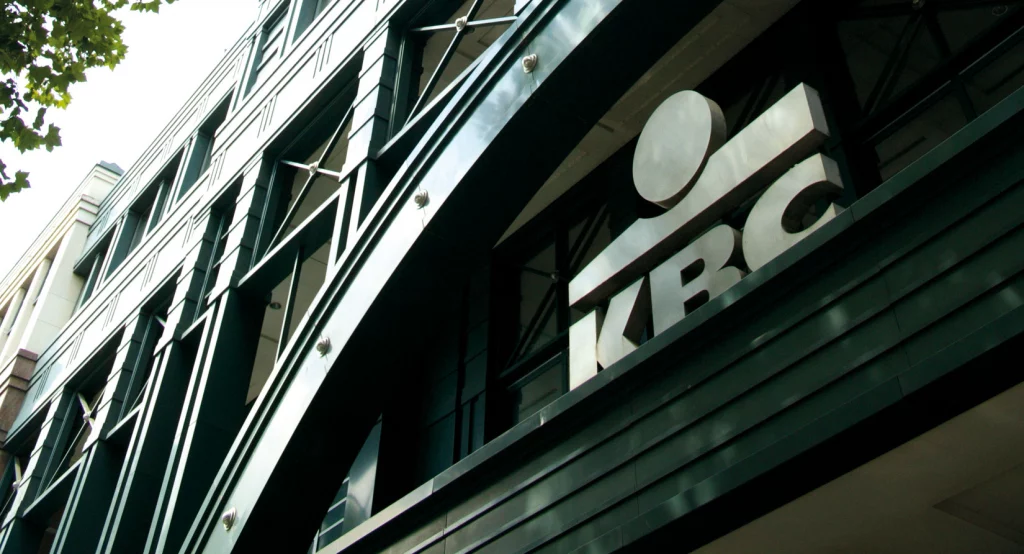KBC Keeps Moving to Maintain its Lead
‘Sustainability is no longer just a PowerPoint presentation, but an integral component of our business at KBC…’

Belgium’s KBC Group may not be Europe’s largest bank — 18th by market capitalisation — it is considered one of the most financially solid.
It is an exceptional performer on many levels. From risk-adjusted CIR (cost-income ratio) and ROE (return on equity) to CET1 (common equity tier 1), KBC routinely outpaces its peers by 20 percent or more. The bank consistently features among the most profitable in Europe, with financial returns of more than 15 percent.
The bancassurance group is generous to shareholders as well, paying out dividends totalling €10.60 per share over 2021, representing a return of over 16 percent on the late September share price of €51.66. That value of €2.6bn — €3.6bn including a special coupon — propels KBC Group to the top of the BEL20 index of largest publicly listed companies in Belgium.
In August, CEO Johan Thijs announced “excellent” Q2 results with a net profit of €811m over the three-month period, beating market expectations by about €100m. Higher interest rates, especially from its business units in Czechia and Hungary, boosted results — but are probably of a temporary nature.
While higher interest rates may continue to underwrite group profits, inflation is driving operating costs higher. Thijs warned investors not to jump to the conclusion that KBC Group is immune to the fallout from the war in Ukraine and the anticipated economic headwinds. “GDP growth is slowing, and inflation is much higher than expected,” he said. “That cannot fail to have an impact on the group. This may not yet be reflected in the overall results, but can already be detected in the details.”
 Closing the Gap at KBC
Closing the Gap at KBC
One of those details concerns the closing of the interest rate gap between the Eurozone and Czechia, KBC Group’s second-home market. The Czech National Bank was quick to raise its base rate (currently seven percent), which enabled KBC Group to profitably park some of its ready cash at the group’s ČSOB daughter. However, Thijs cautioned that the ECB’s recent and future rate hikes will narrow this gap. He expects the European Central Bank (ECB) to raise its base rate to at least 2.5 percent by the end of 2023.
Another hit may come from the inclusion of banks in the windfall tax under consideration by the Czech government. During a recent conference call with analysts and portfolio managers, Thijs said that conversations with the government were ongoing, and that one of the alternatives under discussion is increased bank financing of major infrastructure projects. Last year, ČSOB contributed almost €700m to the group’s €2.64bn profit.
In Hungary, where KBC Group owns K&H Bank, a similar tax — a 10-percent levy on net revenue for 2022, reduced to eight percent in 2023 — was introduced as part of a set of fiscal emergency measures to raise an additional €2.9bn for the treasury.
KBC Group is also active in Slovakia and Bulgaria, where it recently acquired the 122 branches of Austrian Raiffeisenbank for a reported €1bn, further consolidating the group’s position in Central Europe.
Looking Forward
At home, KBC Group seems well-equipped to weather any storm. In Q2, the bancassurer shifted €45m from its unused corona buffers to provisions for possible losses on its credit portfolio because of the looming recession. The group’s cushion for absorbing setbacks now amounts to €268m and is set to further increase by year’s end.
Thijs expects economic growth in Belgium to fall from 2.4 percent in 2022 to 0.3 percent next year. “That forecast is based on a continuation of the war in Ukraine, but excludes an escalation of hostilities. We also assume that Europe is able to compensate for the loss of Russian natural gas deliveries.”
Should that scenario not hold, the Belgian economy may shrink by as much as 2.5 percent — and double that in Central European economies where KBC Group holds significant interests. As cautious as Thijs is, he remains buoyant on the group’s resilience. An early embrace of fintech allowed the group to keep spiralling operating costs in check through increased productivity.
That’s where “Kate” quietly enters the equation: KBC’s customer-facing bot has charmed accountholders. Driven by AI and deep learning (a subset of machine learning that exploits neural networks to mimic the learning process of the human brain), Kate is seen as the way of the future.
Pushing the Tech Envelope
Developed in-house, Kate’s success prompted KBC to launch DISCAI, a spinoff to market the company’s AI prowess. It has already obtained 25 patents on AI tech, and now seeks to monetise that.
A first application that detects money laundering via the analyses of unusual patterns in business transactions is being offered for sale to virtual and traditional banks — essentially competitors.
“We don’t have an issue with that at all, nor does it detract from KBC’s competitive edge,” says Thijs. His bank has used the technology along with its regular AML protocols for three years. “Standard systems detect between 10 and 15 percent of AML cases. We think our technology ups that to around 50 percent.” DISCAI also markets an application that checks if partners to any transaction feature on a blacklist or are subject to international sanctions.
Musing about the outsized potential of DISCAI, Thijs may still take the tech company public. “Things usually move fast in the tech-sphere,” he points out. “Our team of 100 AI developers is the envy of the industry, and there is no saying where it will take us next.” Other financial institutions have discreetly inquired if the technology that powers Kate may be for sale. “Not yet,” is the response.
Thijs has expressed concern about the dearth of IT specialists. KBC Group is recruiting, but it’s a tough market because of the heavy war for talent.
KBC Minting Coin
Kate is more than a helpful bot; she also gave birth to a stable coin. In June, KBC Group ventured into crypto with its blockchain-based Kate Coin. Kate Coin operates in a closed-loop environment, outside of which it has no value. The idea is to reward accountholders with Kate Coins. The tokens can be redeemed within the KBC universe, and debuted flawlessly on snacks and cold drinks for several thousands of KBC employees at the Werchter Boutique music festival in June.
“This is much more than just a fancy loyalty programme,” says Thijs. “Kate Coin enables us to nudge customers towards, say, sustainable and responsible investment options. Also, someone looking for a credit to buy solar panels may receive extra coins in their wallet.
“During our Kate Coin pilot in the city of Leuven, customers could use coins to charge their electric vehicles. In a next phase, we may open the Kate Coin environment to include corporate clients and even the government. The possibilities are truly endless.”
KBC is the first European financial institution to launch its own digital coin, but it is no stranger to blockchain and successfully pioneered its application in trade finance.
The ECB has picked Amazon to develop user interfaces for its digital currency, which irks Thijs. “We have the knowhow right here in Europe, and KBC in particular has a track record second-to-none when it comes to building digital banking apps.” His annoyance may be justified. KBC Mobile has been recognised and celebrated as the world’s most user-friendly banking app.
The app and Kate are creating an environment that stretches beyond banking. With a few taps or swipes, KBC Mobile users can buy tickets for public transport, make reservations at restaurants, book seats at shows, and claim discounts and cashbacks at 70 retailers.
Minding the Core
But KBC Group keeps its corporate eye on the core business of banking and insurance. Thijs says the technology is deployed for the convenience of account- and policyholders, saving them time and money.
In Belgium, KBC Group has a network of 439 branch offices and 310 insurance agents. In early September, the company doubled its private banking branches, taking the total to 28, and trebled its commercial banking offices to 24. The reasoning is to better serve corporate and individual accountholders who have at least €250,000 to invest.
Thijs sees the bancassurer’s efforts to take the lead in the digital domain as an essential part of KBC Group’s wider strategy. “Since 2012, we have incorporated sustainability into our operations and decision-making processes.
“Sustainability is no longer just a PowerPoint presentation, but an integral component of our business.”
In Belgium, the group shuns transactions that have an outsized environmental impact. In Czechia, KBC has reduced its exposure to the coal industry by over 80 percent. “Given that country’s continued dependency on coal, we have been unable to complete exit the sector,” Thijs admits, “but the Czech government has committed to fully phase-out coal from the domestic energy mix by 2033.” The group has appointed a sustainability director in each of its markets to screen and assess investment and credit portfolios for environmental impact.
Responsible Behaviour
“Data is, in a sense, the new electricity that drives our business. Data is also needed to properly gauge the impact of our sustainability initiatives. Three years back, we offered KBC Group management training in responsible behaviour, including customer relations. It has earned the group a nomination for inclusion in the world’s 10 most sustainable corporates.”
Over the next few years, KBC Group aims to perfect Kate and take her to the next level. “We expect Kate to address 75 percent of customer inquiries and enable a seamless integration between humans and machine. Kate also operates at the core of a platform designed to save our customer both time and money — and considerably add to the simplification of transactions and interactions.
“Kate must perfect the user experience and earn the trust of KBC Group customers. I also aim to use AI to reduce institutional risk and contribute to the perfection of the group’s overall risk-mitigation framework.”
Thijs has been at the helm of the KCB Group for 10 years. His time at the helm has been characterised by a willingness to delegate and adapt to changing times.
Though he admits that the corona pandemic changed everything, he is not nostalgic. “There was a big and sudden push towards digital. KBC Group was and remains exceptionally well-placed to respond to this shift in consumer demand.
“Our push into tech and digital paid off. If anything, this shows the value of discerning longer-term trends and shaping a clear vision of the future and how you, as a corporate, fit into that scenario. A responsiveness to change is required. Looking back to yesterday, or remaining set in your ways for tradition’s sake, is not our way forward.
By Wim Romeijn
You may have an interest in also reading…
CFI.co Meets Kayode Falowo
Greenwich Trust Limited is a boutique Investment Bank focused on creating value for its various stakeholders. The firm was incorporated
World Bank Group: Ask Citizens Where Public Money Should Go – The Surprising Results
As citizen engagement gains traction in the development agenda, identifying the extent to which it produces tangible results is essential.
James “Jamie” Dimon: How Not to Be a Good Banker
The CEO, chairman and president of JPMorgan Chase has no shortage of supporters and fans. Just two years ago, James

















































































